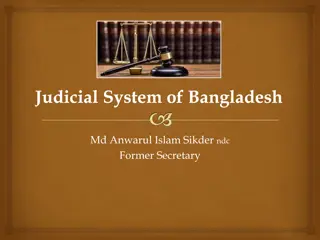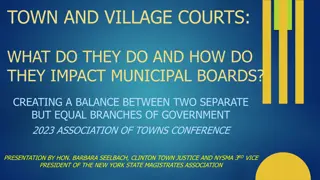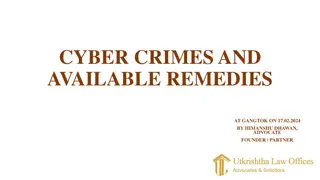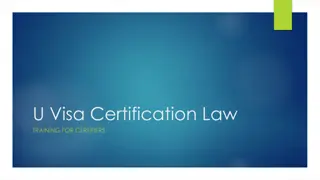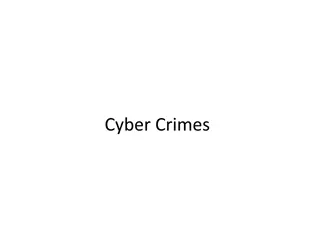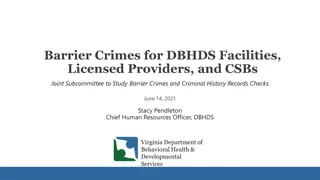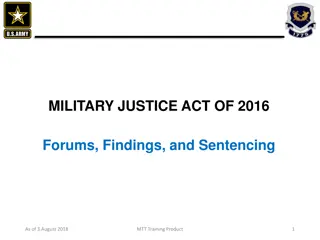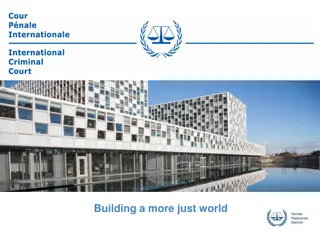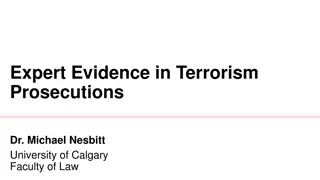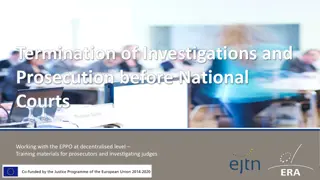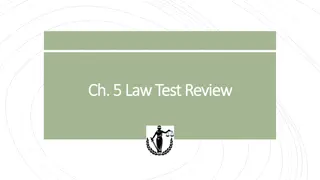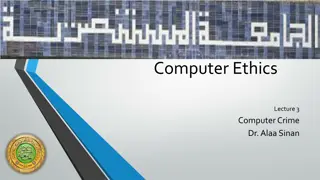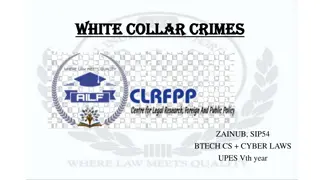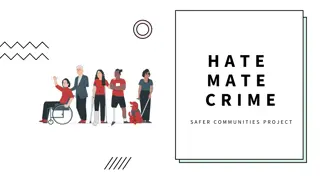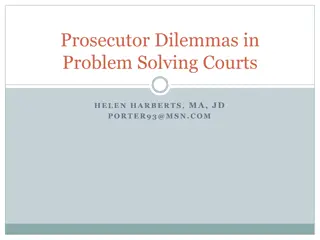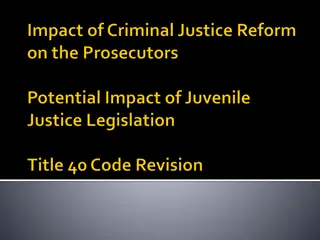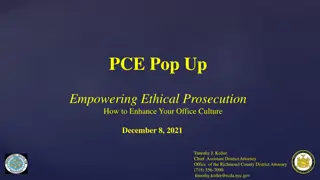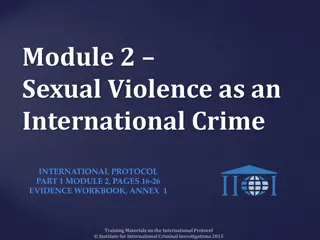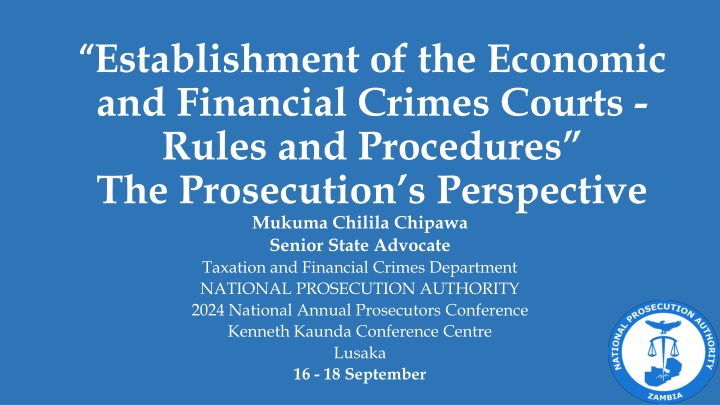
Insights into Economic and Financial Crimes Court Establishment and Procedures
Gain valuable insights into the establishment and operational procedures of the Economic and Financial Crimes Courts from the prosecution's perspective. Discover the background, benefits, and rules governing these specialized courts, ushering in a new era of prosecuting corruption and financial crimes cases efficiently.
Download Presentation

Please find below an Image/Link to download the presentation.
The content on the website is provided AS IS for your information and personal use only. It may not be sold, licensed, or shared on other websites without obtaining consent from the author. If you encounter any issues during the download, it is possible that the publisher has removed the file from their server.
You are allowed to download the files provided on this website for personal or commercial use, subject to the condition that they are used lawfully. All files are the property of their respective owners.
The content on the website is provided AS IS for your information and personal use only. It may not be sold, licensed, or shared on other websites without obtaining consent from the author.
E N D
Presentation Transcript
Establishment of the Economic and Financial Crimes Courts - Rules and Procedures The Prosecution s Perspective Mukuma Chilila Chipawa Senior State Advocate Taxation and Financial Crimes Department NATIONAL PROSECUTION AUTHORITY 2024 National Annual Prosecutors Conference Kenneth Kaunda Conference Centre Lusaka 16 - 18 September
Establishment of the Economic and Financial Crimes Courts (EFCCs) Background Previously we did not have the EFCCs We had the Gender Based Crimes Courts (GBC Courts) and the Road Traffic Offences Courts (RTO Courts) Fast Track Courts (FTCs) The 2021 pronouncement of the intention to create EFCCs roused excitement among Asset Recovery and Financial Crimes Practitioners. For years we watched and observed with keen interest the developments, challenges, lessons and successes in the FTCs.
From existing FTCs, we observed that from operating within an environment of specialized courts and prosecutors the benefits were abound: It created an opportunity for capacity building through specialised trainings for prosecutors and the courts operating within the specialised FTCs. It allowed prosecutors to focus on the relevant laws, research and develop individual capacity within their specific area of operation. Creation of synergy between the Courts and Prosecutors of the legal issues Led to independent, effective, fair and consistent prosecutions inline with our vision. As prosecutors of AR and FCs, we were excited at the opportunity to reap similar benefits. The creation and actualization of the EFCCs and the Inter-Agency Cooperation framework reverberates very well with this year s theme The Pursuit of Prosecutorial excellence: Interagency Cooperation and Global Alliances
THE EFCCs High Court Division Subordinate Court Division Both Courts are vest with Criminal and Civil Jurisdictions, where we can present and the courts can determine criminal cases concerning corruption and economic and financial crimes. On the civil spectrum we can present for determination Non-conviction forfeiture applications and conviction based forfeiture application pursuant to the Forfeiture of Proceeds of Crimes Act No.19 of 2010. Currently the Civil actions taken by prosecutors to the EFCC are regulated by the Ordinary Rules of Civil Procedure while for Criminal matters Statutory Instrument No.10 of 2024 cited as the Criminal Procedure Code (Economic and Financial Crimes Court) Rules 2024 was enacted.
THE CRIMINAL PROCEDURE CODE (ECONOMIC AND FINANCIAL CRIMES COURT) RULES 2024 The rules came into operation on 1stMarch 2024 per rule 1(2) The rules had an effect on matters in the EFCC that commenced pre and post the rules. With the actualisation of the EFCCs and the enactment of the Rules the spot light was fully lit on prosecutors and our abilities to operate and deliver within the very demanding environment of the new courts. The rules brought about a number of developments that changed and challenged the traditional way prosecution was done especially in the Subordinate Court. The initial reaction was dread, but with time we have come to relish the challenges and more so the feeling of surmounting them.
DURATION OF PROCEEDINGS Rule 3 sub-rule (1) Matters to be concluded within 5 months from date plea is taken. Sub-rule (2) Gives allowance for Extension by a further 45 days on an application by a party or on the court s own motion. Sub-rule (3) provides that a Judge or Presiding Magistrate to render a report if the matter is not disposed of within the period stated in sub-rule (1) Sub-rule 4 further provides: The report referred to in sub-rule (3) shall contain the following: (a) the reasons for the delay in disposing of the matter; and (b) where the matter is pending (i) hearing, the directions given to the parties; or (ii) delivery of judgment, the new date given to the parties on which the judgment shall be delivered.
CONSEQUENCE OF FAILING TO CONCLUDE WITHIN PRESCRIBED PERIOD Citibank Zambia Limited and Suhayl Dudhia SCZ Appeal No. 6 of 2022 Where as in this case, the provision being considered is silent or unclear as to the consequences of a breach will be, the Judge has the duty to interpret the provisions of the statute to fit the purpose for which the statute was drafted and thereby avert reading into the statute unintended consequences for its non-observance. We may also add that the one-year rule (for expeditious disposal of industrial and labour disputes) was not intended to lock litigants who, through no fault of their own, could not have their cases determined within one year.
SOME FACTORS THAT EFFECT DISPOSAL OF EFCC CASES WITHIN THE DURATION PERIOD Nature and cause of delay Complexity of some matters Illness of party to litigation Temporal unavailability of vial witnesses for considerable times Availability of dates for the Court, Prosecutors and Defence (both Counsel and the Client)
FILING OF LIST OF WITNESSES, WITNESS STATEMENTS, DOCUMENTS AND SERVICE OF DOCUMENTS Rule 4 obligates the prosecution at the time of filing a charge to file a) A list of witnesses we intend to call during trial b) Their witness statements c) A list and copies of documents to be relied on at trial Rule 5 requires service within 14 days of filing the documents in rule 4 on the accused or his legal representatives. Rule 5 sub rules 4 and 5 provide that documents and witnesses statements not served as well as witnesses not mentioned in the list of witness shall not be relied on or testify during trial.
Rule 5(6) provides for the prosecution, with leave of Court to (a) Disclose documents or witness statements at any stage during the proceeding if the court is satisfied that the documents or witness statements were not available at the initial filing under rule 4. (b) Amend the list of witnesses or call additional witnesses. We have trial by ambush in the EFCC Subordinate Courts The interpretation and application of Rule 5(6)(a) has proved to be an interesting point of discussion especially with regard witnesses initially disclosed pursuant to rules 4 and 5 and them being allowed to testify and produce documents.
PRE-TRIAL CONFERENCE Rule 6 provides for pre-trial conferences where the court and the parties have been dealing with preliminaries before the matter goes into trial proper such as: Confirmation of consent from the DPP Issuance of directions on date of plea Confirmations of compliance with the rules for filing and service Establish issues relating to admissibility of evidence Set dates for commencement and length of prosecutions case
CASE TO ANSWER Rule 7 provides that an accused person found with a case to answer shall disclose by filing into court within 14 days documents they intended to rely on during the defence. NB: The rules do not place an obligation on the accused to provide witnesses statements or a list of witnesses. Rule 8 provides for pre-defence conferencing to establish i.e compliance with rule 7, number of witnesses intended to be called, issues relating to admissibility of evidence.
GENERAL PROVISIONS Rule 9 provides for abridgment and extension of time specified in the Rules for taking any step in connection with the proceedings Rule 10 provides that adjournment shall only be granted on compelling and exceptional circumstances Rule 13 makes provision of the use of audio visual conferencing a witness or accused person to attend proceedings or give evidence
The end Thank You

![Prevention and Combating of Hate Crimes and Hate Speech Bill [B.9B.2018]](/thumb/60513/prevention-and-combating-of-hate-crimes-and-hate-speech-bill-b-9b-2018.jpg)
